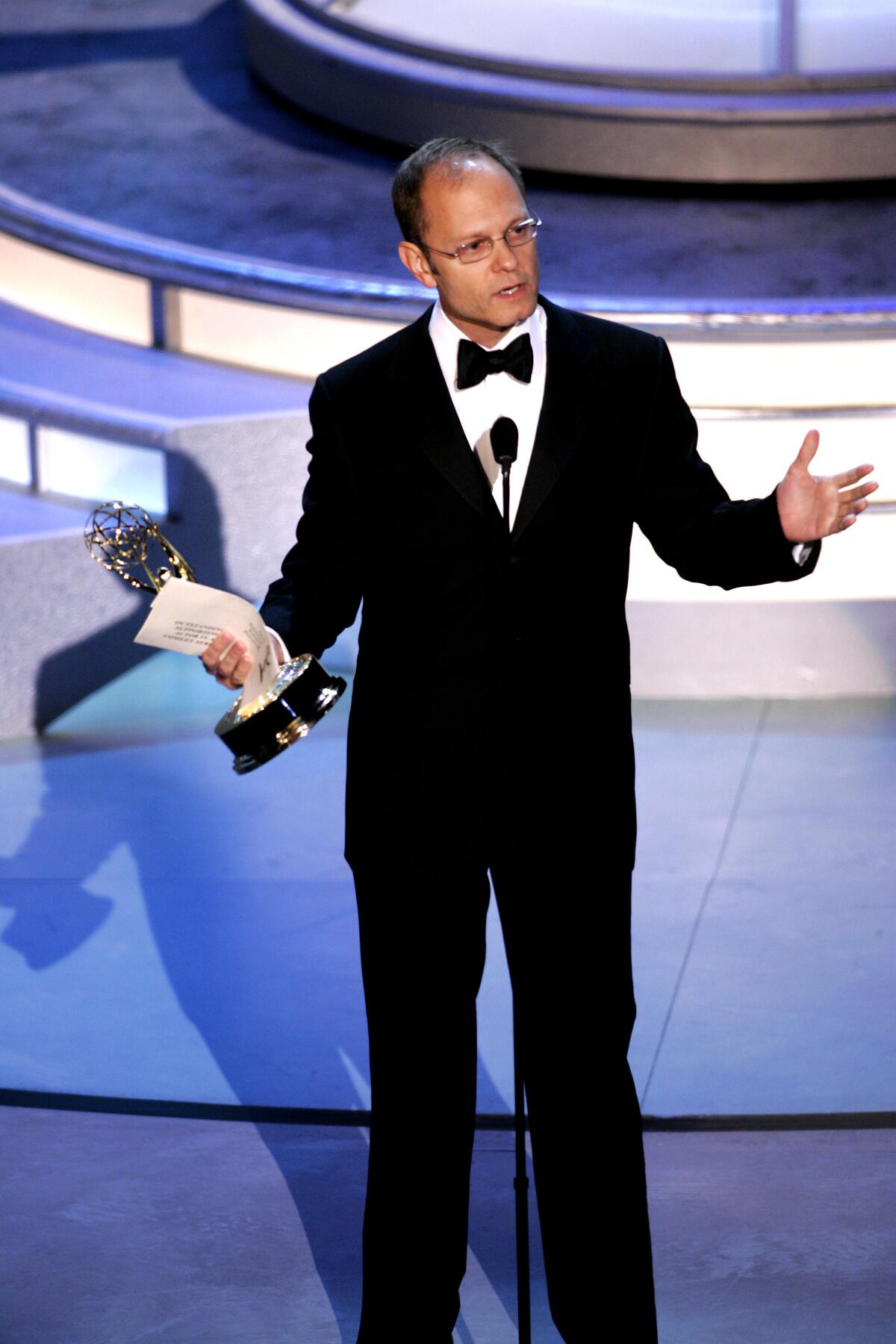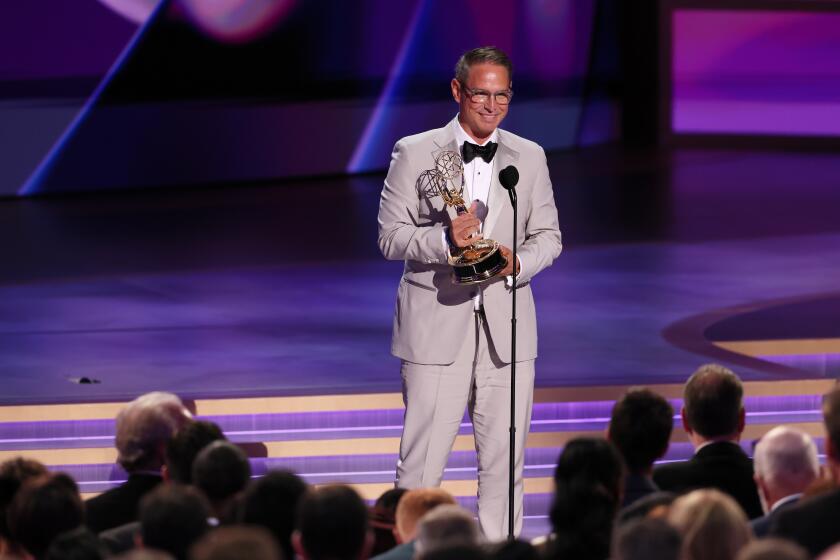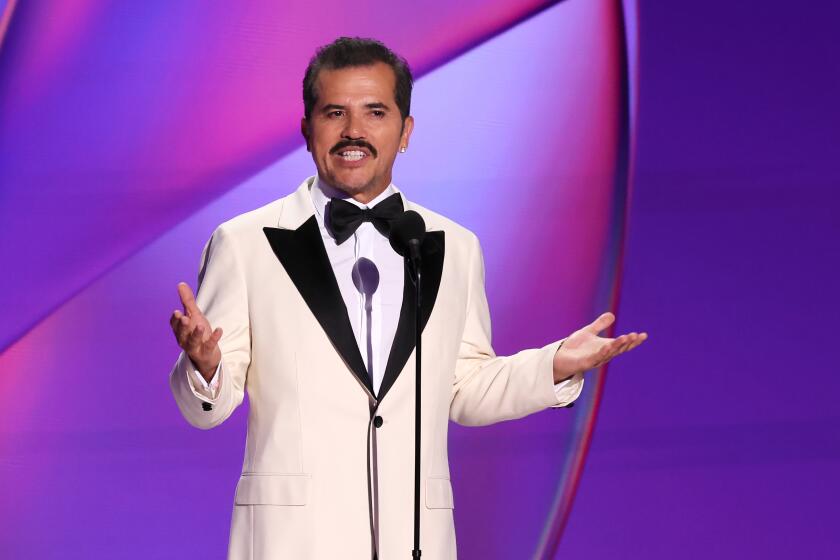20 years ago at the Emmys: David Hyde Pierce keeps his streak alive

A glance back at the nominees in the supporting actor categories at the 56th Primetime Emmy Awards proves that a modern golden age of TV was in full force. Whether it was the tail end of a remarkably stable comedy lineup, the long-awaited breakthrough for a standout drama or the ongoing domination of one show in the miniseries category, the performances being honored on Sept. 19, 2004, at the Shrine Auditorium in Los Angeles were extraordinary then — and still memorable decades later.
‘Frasier’ ends with a new record set
David Hyde Pierce earned his fourth supporting actor in a comedy Emmy for playing the fastidious Niles Crane in “Frasier” (NBC), a show that wrapped its 11 seasons that May. (The series returned on Paramount+ in 2023 without Pierce.) He’d been nominated consecutively each year of the show’s run, becoming the actor with the most nods in this category.
Pierce was up against a few familiar names: Brad Garrett (“Everybody Loves Raymond,” CBS), who’d won in this category in 2002, 2003 and would win again in 2005; 1996 Emmy-winner Peter Boyle (“Raymond”); Sean Hayes (“Will & Grace,” NBC), who won in this category in 2000 and would win a second Emmy in a different category in 2011; and Jeffrey Tambor (“Arrested Development,” Fox), who would go on to win Emmys in 2015 and 2016.
About that remarkably stable lineup: From 2000-05, Boyle and Hayes were nominated every year, with Pierce and Garrett being included five of the six times.
“It’s not the way I would have gone, but OK,” Pierce quipped to the audience after accepting the award from presenters Chris Noth and Sarah Jessica Parker. After giving his thanks, he added, “They say television and comedy in television is changing, and I just want to say when it changes back, call me.”
Bada bing! A big win for ‘Sopranos’ supporting
It was a big night all around for “The Sopranos” (HBO), which dominated not just the drama series category but also took home both supporting actor and actress Emmys for Michael Imperioli and Drea de Matteo, respectively. It was Imperioli’s third nomination for playing gangster Christopher Moltisanti in the series, and his only win. He was up against co-star Steve Buscemi, who earned a short form variety series Emmy in 2016; first-time nominee Brad Dourif (“Deadwood,” HBO); Victor Garber (“Alias,” ABC), who was nominated for this role three times; and John Spencer (“The West Wing,” NBC), who won his Emmy for this role in 2002. He died in 2005.
“Being on ‘The Sopranos’ is like the greatest thing in the world for an actor, and if this was the only thing I’d ever done I’d be OK with that,” Imperioli told the audience after accepting the Emmy from presenters Blair Underwood and Heather Locklear. “Probably.”
An angelic wish for the future
Four of the five nominations in supporting actor in a miniseries or movie went to first-time nominees, all from HBO’s juggernaut “Angels in America,” with Jeffrey Wright (who played several characters in the miniseries) winning the award. He was the first Black actor to win in the category since James Earl Jones (also a nominee as a guest actor in 2004) won in 1991.
He was up against fellow “Angels” Justin Kirk, Ben Shenkman and Patrick Wilson, all on their first Emmy nomination; and two-time Emmy veteran William H. Macy, who played John Irwin in “Stealing Sinatra” (Showtime).
Wright accepted the Emmy from presenters Debra Messing and Eric McCormack, and he lavished praise on his fellow cast and crew, then continued through two awkward orchestral cues to speak up for the ongoing victims of AIDS. “When I originally started this journey with this piece [Wright originated two of his miniseries roles in the original 1993 Broadway production of “Angels”], AIDS affected mainly gay men; now the disease affects African Americans in extraordinary numbers…. I hope that in accepting this I might be an inspiration to actors who want to tell those stories and keep those realities and struggles alive in the public dialogue.”
More to Read
From the Oscars to the Emmys.
Get the Envelope newsletter for exclusive awards season coverage, behind-the-scenes stories from the Envelope podcast and columnist Glenn Whipp’s must-read analysis.
You may occasionally receive promotional content from the Los Angeles Times.










